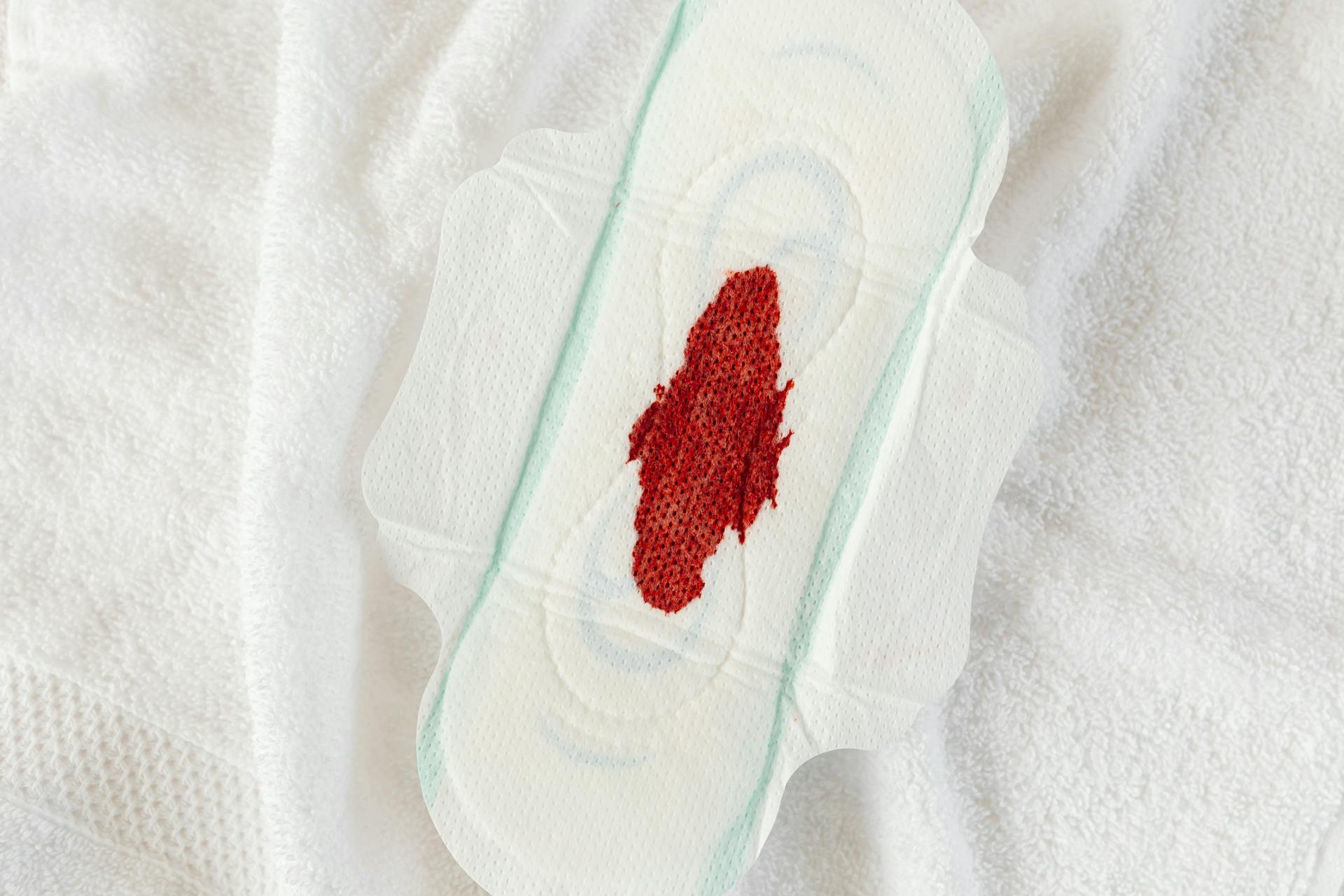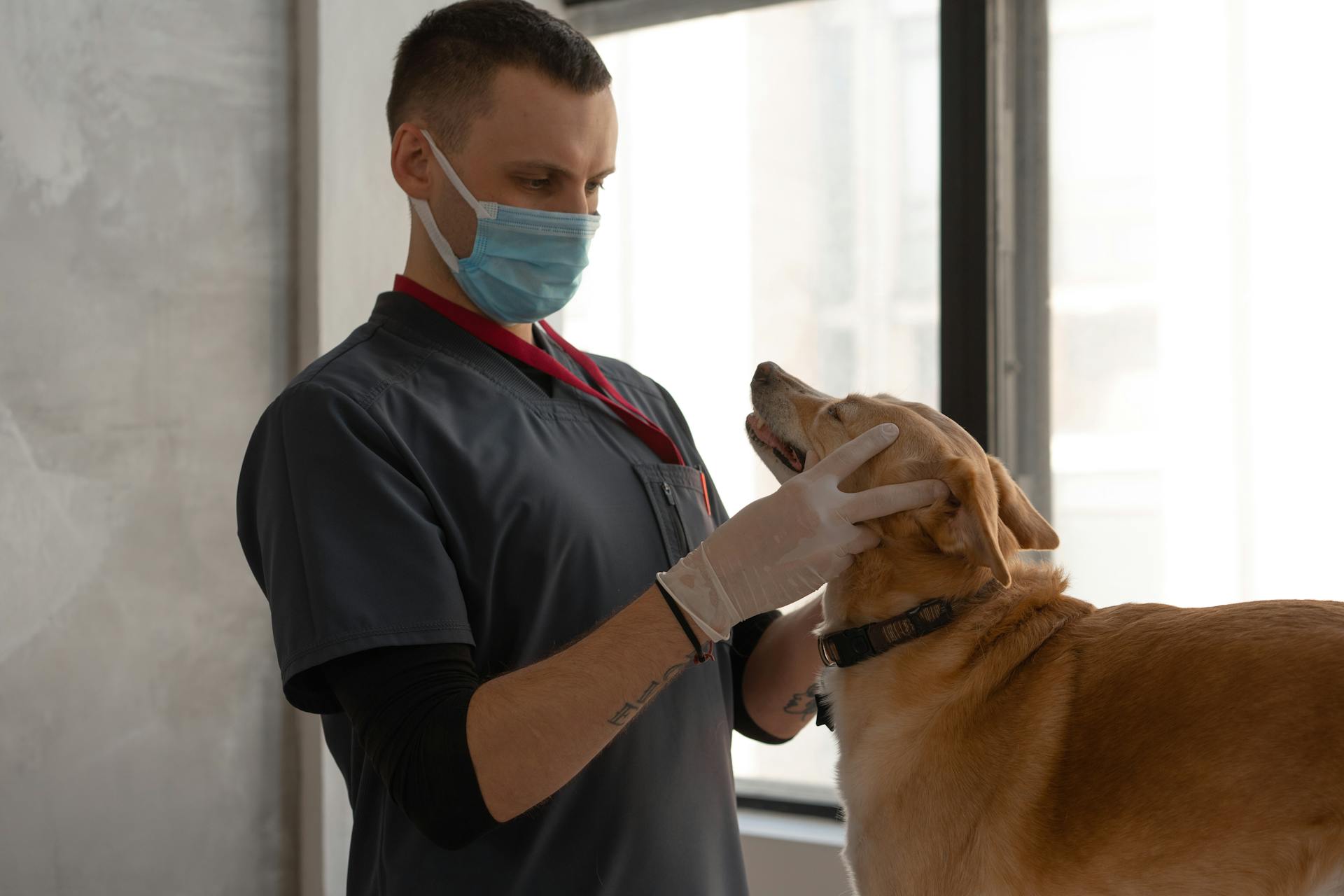
Blood in a puppy's stool can be a concerning sight for any dog owner.
It's essential to identify the underlying cause to ensure your furry friend receives proper treatment.
In most cases, blood in a puppy's stool is a sign of gastrointestinal issues, which can range from mild to severe.
According to the American Kennel Club, gastrointestinal problems are one of the most common health issues in puppies.
If you notice blood in your puppy's stool, it's crucial to monitor their overall health and watch for other symptoms such as vomiting, diarrhea, or lethargy.
These symptoms can indicate a more severe issue, such as gastrointestinal obstruction or inflammatory bowel disease.
Discover more: Pancreatitis Blood in Stool Dogs
Causes of Blood in Stool
Blood in your puppy's stool can be a worrying sign, but understanding the possible causes can help you and your vet get to the bottom of it. Melena, a type of blood that's darker, sticky, and tar-like, often points to issues in your puppy's upper digestive tract.
The causes of melena can be quite varied, including parasites, liver cancer, ulcers, blood clotting disorders, post-surgery complications, tumors, polyps, or even ingestion of blood. I've seen it happen with puppies who've licked a bleeding wound or had a mouth injury.
Hematochezia, on the other hand, is characterized by bright red blood in the stool, typically stemming from bleeding in the lower digestive tract, rectum, or colon. This can be caused by parvovirus, hemorrhagic gastroenteritis, cancer, viral and bacterial infections, parasites, or even colitis.
Other possible causes of blood in your puppy's stool include intestinal blockages, trauma, bacterial infections, or fissures. These can be just as serious as the other conditions, so it's essential to get your puppy checked out by a vet as soon as possible.
Here are some of the possible causes of blood in your puppy's stool:
- Melena: upper digestive tract issues, parasites, liver cancer, ulcers, blood clotting disorders, post-surgery complications, tumors, polyps, or ingestion of blood
- Hematochezia: bleeding in the lower digestive tract, rectum, or colon
- Other causes: intestinal blockages, trauma, bacterial infections, or fissures
Diagnosis and Testing
Your veterinarian may recommend additional diagnostic testing to determine the cause of bloody diarrhea.
The vet will do a basic examination to identify any underlying issues.
Depending on the results, more advanced diagnostics may be used, which can include fecal exams.
A fecal exam involves a microscopic examination of your dog's stool to look for parasites or microbiological organisms.
In some cases, routine diagnostic procedures may fail to pinpoint the cause, requiring more invasive diagnostic testing.
Symptoms and Signs
If there's a slight appearance of blood in your dog's poop, it may not be a serious condition, but it's still worth getting them checked out by your vet.
A large amount of blood in your dog's poop is a cause for concern and warrants an emergency vet visit.
Bloody diarrhea, vomiting, and lethargy are all signs that your dog needs immediate attention from a vet.
Physical Examination
During a physical examination, your vet will visually observe a stool sample, if you've brought one, to look for any abnormalities.
Your vet will also palpitate your dog's abdomen to check for signs of an abdominal obstruction or pain.
They'll check your dog's cardiovascular function to see if there are any signs of blood loss or dehydration.
A dog skin test can be performed to determine if your dog is dehydrated.
Your vet will examine your dog's mucus membranes to look for signs of hemorrhagic losses.
Your vet may also perform a visual examination of the stool or palpitate the abdomen to check for signs of an abdominal obstruction or pain, or check cardiovascular function to look for signs of blood loss or dehydration.
Here are some of the physical examination procedures your vet may perform:
- Visual observation of a stool sample
- Palpitation of the abdomen
- Check cardiovascular function
- Dog skin test
- Examination of mucus membranes
Abnormal Stool Consistency
If there's too much blood in your dog's stool, it's worth getting them checked out by a vet.
A slight appearance of blood in your dog's poop may not indicate a serious condition, but it's still a good idea to have them examined.
If your dog is suffering from bloody diarrhea, it's a sign they need urgent attention.
Large amounts of blood in your dog's poop or vomiting are serious symptoms that require a trip to the emergency vet.
How Often Is Too Often?
If you notice a sudden appearance of a small amount of blood in your dog's poop, it's usually not a cause for concern, but it's always a good idea to inform your vet.
A single incident of blood in the stool typically doesn't indicate a serious issue, but frequent blood in your dog's poop is a different story.
You should contact your vet right away if your dog shows serious signs of being sick, such as lethargy, vomiting, or diarrhea.
Help! There's Removed!

If you spot blood in your dog's stool, there can be a number of reasons, from a parasitic infection to internal trauma. It helps to know the signs of the different types of bleeding so you can be prepared to take the appropriate next steps in seeking treatment.
If you're unsure what to do, it's always best to err on the side of caution and contact your vet right away. If there is frequent blood in your dog's poop or if your dog shows serious signs of being sick, such as lethargy, vomiting, or diarrhea, you should contact your vet immediately.
A sudden appearance of a small amount of blood a single time usually won't indicate a more serious situation at hand, but your vet should always be informed when you see anything unusual.
If you are unable to take a photo of the bloody poop, it will be helpful to know the two types of blood you may find. These are hematochezia and melena.
Here are the differences between the two:
- Hematochezia: This type of blood is bright red and occurs in the lower digestive tract or colon.
- Melena: This blood is dark, sticky and sometimes jelly-like, indicating a problem in the upper digestive tract.
If you do take a photo, it can help with the diagnosis if you can also bring a sample of your dog's bloody poop to show your vet.
Frequently Asked Questions
Does blood in puppy poop always mean parvo?
Blood in puppy poop doesn't always mean parvo, but it's a possible sign of the viral infection. If you suspect parvo or any other health issue, consult a veterinarian for proper diagnosis and care.
Will a bloody puppy stool heal on its own?
Blood in a puppy's stool may resolve on its own in a few days, but it's essential to investigate the cause to ensure it's not a more serious issue
Sources
- https://vcahospitals.com/know-your-pet/hemorrhagic-gastroenteritis-in-dogs
- https://www.raetc.com/site/blog/2024/04/15/dog-stool-blood
- https://www.brookhavenanimalhosp.com/site/blog/2022/08/30/blood-in-dogs-stool
- https://www.amcne.com/site/blog/2023/09/15/blood-dogs-stool--emergency
- https://ourpetshealth.com/info/causes-of-blood-in-poop
Featured Images: pexels.com


